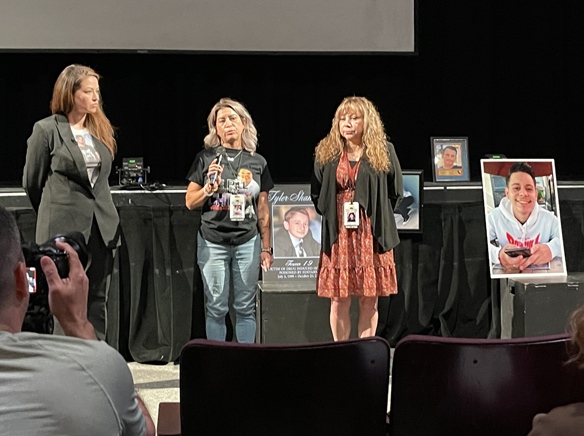
The founder of a nonprofit organization whose son died taking a pill he did not know was laced with Fentanyl spoke to parents and students at the Los Alamitos High School this past week, telling them her son was “deceived to death.”
Perla Mendoza, of Seal Beach, spoke this week at the Los Alamitos High School Performing Arts Center as approximately 150 parents and students listened to the story of how quickly her son, Daniel Elijah Figueroa, himself a former LAHS student, lost his life to Fentanyl.
“It was the worst thing I ever experienced,” Mendoza said of her son’s death.
Mendoza said her son thought he was taking a prescription painkiller he purchased from someone through social media. The pill ended up containing a lethal amount of fentanyl.
Mendoza said she refers to her son’s death as “fentanyl poisoning” rather than an overdose.
“I use the term drug poisoning because many of our children have died thinking that they’re taking one thing when it was really something else. They were deceived to death,” Mendoza said.
“My son made a mistake and he paid for it with his life,” she said.
“My intention is only to spread awareness and to share information that I wish I would have known about three years ago; information that I wish I would have been able to share with my child,” Mendoza told the audience gathered at Los Alamitos High School, the school her son once attended.
“I realize my child’s gone; nothing I can do will bring him back. But my goal is to save your kids and your grandkids from having the same fate.”
Legislators, local law enforcement authorities, and school administrators now agree that Fentanyl has become a huge problem.
More young people are dying from opioid overdoses in Orange County, especially from the synthetic and powerful opioid known as fentanyl, authorities say, which is turning up in pills kids think are prescription drugs like Xanax or Percocet.
“The impact of fentanyl on our school communities is unprecedented, and the most important step we can take is to become more aware of this deadly drug and how it’s getting into the hands of young people,” Stephan Lambert, coordinator of prevention education in OCDE’s Student Achievement and Wellness Unit, said in a press release.
“It’s also critical that we spread the word on preventative measures and steps that we know can save lives,” Lambert said.
Accordingly, the Orange County Department of Education and the Orange County Health Care Agency co-hosted two free events for local families, educators, and others about the dangers of opioids on Tuesday, May 9, which is known as National Fentanyl Awareness Day.
At the Los Al Unified Fentanyl Awareness event last week, families were given a free dose of naloxone that can prevent death in an overdose situation and taught how to administer it, watching this 11-minute video from the California Department of Public Health.
The video explained what an opioid overdose looks like.
A person overdosing on opioids will not respond to stimulation, they may be deep snoring, gurgling, or wheezing, and their skin might have a blue or grayish tinge.
The free naloxone was provided by Perla Mendoza, a former Los Alamitos USD parent.
She was one of several mothers that spoke at the event.
Mendoza shared that she had never even heard of fentanyl before her son’s death.
The opioid is 50 times stronger than heroin and 100 times more potent than morphine.
According to the Drug Enforcement Administration, of the fentanyl-laced fake prescription pills analyzed in 2022, six out of ten contained a potentially lethal dose of the synthetic opioid.
Fentanyl has been found in fake pills that were intended to pass as prescription Xanax, Percocet, Adderall, and more. Fentanyl has also been found in marijuana edibles and even vaping cartridges.
Bills that would increase punishments for dealers who sell fentanyl-laced drugs that kill people have failed in the California legislature.
The most recent defeat came last month.
At last month’s fentanyl awareness event, Mendoza warned parents that the drug dealers are using social media, including Snapchat, to target kids.
She shared a graphic showing the emojis some dealers use to communicate that they are selling drugs.
“I wish I would have known about Fentanyl,” said Maria Ortega, whose son died from Fentanyl poisoning. “Who’s going to think these drugs are going to be delivered to our kids’ homes,” she said.
“We used to think that as long as our kids were home, they were safe. They are not safe,” she said.
“I’m so impressed with Perla and my heart goes out to all the families,” said Dr. Jerry Friedman, Director of Security and Student Services for Los Al Unified.



